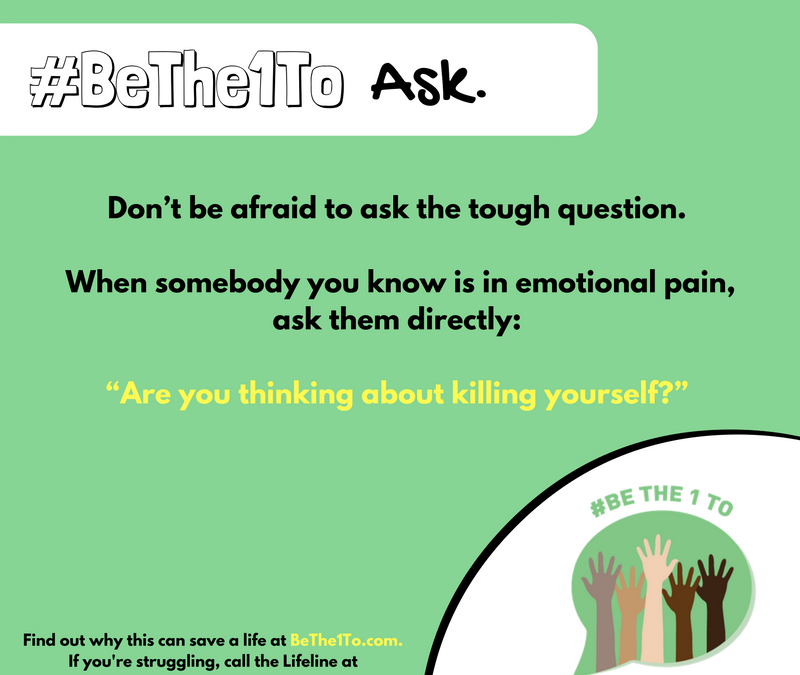1-800-273-TALK
Our COVID-19 Pandemic has taken a serious toll on the mental health of many. The very real consequences of lingering isolation, a return to our new normal, the unrest in the country, the loss of economic security and the changes in the ways we communicate have left people at a higher risk of self-harm.
 This year, #Bethe1To Ask is the Suicide Prevention Week goal. It asks that we not only be aware of those around us who may be calling for help, who may be overwhelmed and who may be considering suicide, but that we reach out to them to see how we might facilitate getting help.
This year, #Bethe1To Ask is the Suicide Prevention Week goal. It asks that we not only be aware of those around us who may be calling for help, who may be overwhelmed and who may be considering suicide, but that we reach out to them to see how we might facilitate getting help.
The Suicide Prevention Lifeline provides a list of risk factors and some ways to help us recognize symptoms of someone who may need our help quickly.
There are risk factors for people who may be thinking of suicide. While these are not predictive of what someone might do, Suicide Prevention Lifeline urges us to be aware of factors that may cause someone to be at a higher risk.
- Mental disorders, particularly mood disorders, schizophrenia, anxiety disorders, and certain personality disorders
- Alcohol and other substance use disorders
- Hopelessness
- Impulsive and/or aggressive tendencies
- History of trauma or abuse
- Major physical illnesses
- Previous suicide attempt(s)
- Family history of suicide
- Job or financial loss
- Loss of relationship(s)
- Easy access to lethal means
- Local clusters of suicide
- Lack of social support and sense of isolation
- Stigma associated with asking for help
- Lack of healthcare, especially mental health and substance abuse treatment
- Cultural and religious beliefs, such as the belief that suicide is a noble resolution of a personal dilemma. Exposure to others who have died by suicide (in real life or via the media and Internet)
New behaviors or changes in behaviors associated with a painful event, a loss or a life change can include some of the following:
- Talking about wanting to die or to kill themselves
- Looking for a way to kill themselves, like searching online or buying a gun
- Talking about feeling hopeless or having no reason to live
- Talking about feeling trapped or in unbearable pain
- Talking about being a burden to others
- Increasing the use of alcohol or drugs
- Acting anxious or agitated; behaving recklessly
- Sleeping too little or too much
- Withdrawing or isolating themselves
- Showing rage or talking about seeking revenge
- Extreme mood swings
Suicide is not inevitable. There is hope, and there is help. It starts by talking about suicide with the person who concerns you. Reduce their access to the things that may be used for self-harm. Follow up with them often. And most importantly help them find supportive services.
- 24/7 Suicide Prevention Lifeline answers the call for those who reach out: 800-273-8255
- Nacional de Prevención del Suicidio 1-888-628-9454

